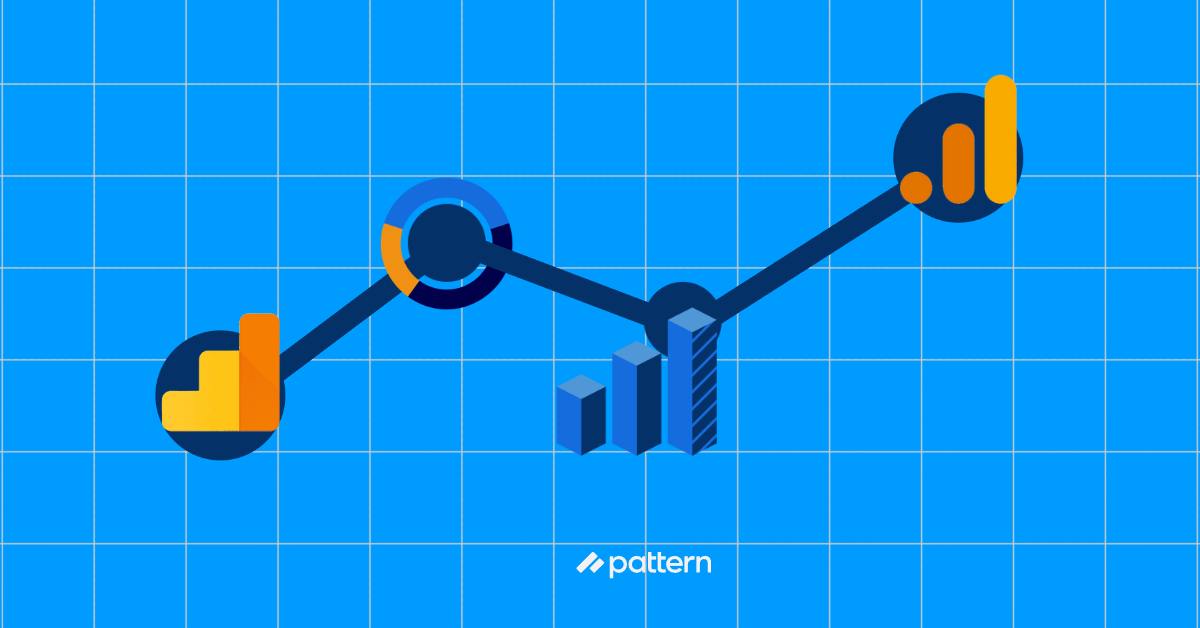In March 2022, Google announced it would be retiring Universal Google Analytics and replacing it with the new and improved GA4. Although most brands are quick to comply, many are facing uncertainty on July 1 2023 when they no longer have a choice of which service to use.
For those who aren’t sure what’s different or how their year’s worth of ecommerce reporting will change, we’ve listed out a few high-level insights to help explain. If you still have questions, reach out to au@pattern.com.
Why Is The Transition To GA4 Important?

GA4 represents Google’s vision for the future of analytics. By adopting GA4, your business can stay aligned with Google’s evolving analytics ecosystem, as the company has indicated that future innovations and enhancements will be focused on GA4 rather than Universal Analytics.
While GA4 introduces many benefits, it’s worth noting that transitioning from Universal Analytics to GA4 might require some adjustments and learning. It’s important to plan the migration carefully and consider the specific needs of your business to fully leverage the advantages of GA4.
What Are The Key Advantages Of GA4

1. Enhanced User-Centric Approach
GA4 focuses on user-centric data analysis rather than session-based tracking. It employs an event-driven data model that allows for a more comprehensive understanding of user behaviour across multiple devices and platforms.
2. Cross-Platform Tracking
The move to GA4 has improved cross-platform tracking, enabling businesses to gain insights into user interactions across websites, mobile apps, and other digital platforms. This is particularly valuable in today’s multi-device and multi-channel landscape.
3. Smarter Insights with AI
Incorporating advanced machine learning and AI capabilities allows GA4 to automatically analyse data and provide valuable insights without requiring complex configurations or manual setup. It helps businesses uncover trends, customer segments, and predictive analytics for more informed decision-making.
4. Simplified Implementation
It simplifies the implementation process with its enhanced measurement setup, utilising an event-based model and reducing the need for manual tracking code customisation. This simplification saves time and resources during the initial setup.
5. Expanded Data Collection
GA4 expands data collection capabilities, enabling businesses to collect more granular data about user interactions. It supports enhanced measurement features like scroll tracking, video engagement, file downloads, and outbound link clicks out-of-the-box, without requiring additional customisation.
6. Privacy-Focused Design
With privacy becoming a major concern, GA4 is designed to comply with stricter privacy regulations. It offers features like enhanced consent management, data deletion controls, and the ability to configure data retention settings. This ensures businesses can collect and process data in a privacy-conscious manner.
What are the Essential Elements You Should be Tracking in GA4

In GA4, you can track various aspects of user behaviour and performance to gain valuable insights about your website or app. Here are some key elements you should consider tracking in GA4:
1. User Engagement
Monitor user engagement metrics to understand how users interact with your website or app. Track metrics like sessions, session duration, bounce rate, and page views to assess user engagement levels.
2. Conversion Events
Identify and track conversion events that align with your business goals. These could include completed purchases, form submissions, newsletter sign-ups, or any other action that signifies a conversion. Tracking conversion events helps you measure the effectiveness of your marketing efforts.
3. User Journeys
Utilise the enhanced path analysis capabilities in GA4 to analyse user journeys to track the sequence of actions users take on your website or app and identify any common paths or drop-off points. This information can help optimise user experiences and improve conversion rates.
4. Demographics and User Properties
GA4 allows you to collect and analyse demographic data about your users, such as age, gender, and interests. Additionally, you can define and track custom user properties to gain deeper insights into user segments, such as customer types, membership levels, or subscription plans.
5. Ecommerce Metrics
If you have an online store, track ecommerce metrics like product views, add-to-cart actions, and purchase behaviour. GA4 provides enhanced ecommerce tracking capabilities that can help you understand customer purchasing patterns to assist you in optimising your sales funnel.
6. Events and Interactions
GA4 is built around an event-driven data model and allows users to identify and track relevant events and interactions that occur within your website or app. This could include button clicks, video plays, file downloads, scroll depth, or any other action that provides insights into user behaviour.
7. Marketing Channels
Monitor the performance of your marketing channels to understand which sources drive traffic and conversions. GA4 automatically tracks channels, such as organic search, direct, referral, and social media. You can also set up tracking for custom campaigns and UTM parameters to gain more granular insights.
8. User Retention
Measure user retention rates to understand how well you’re retaining users over time. GA4 provides cohort analysis capabilities that allow you to track user retention by specific time periods, enabling you to identify trends and make data-driven decisions to improve user engagement and loyalty.
Remember to align your tracking strategy with your specific business goals and objectives. It’s also important to consider privacy regulations to ensure that you’re tracking data in a responsible and compliant manner. To support your businesses transition to GA4 or to understand more about the platform, contact us now for GA4 training and audits for your internal GA4 setup from our SEO experts.



